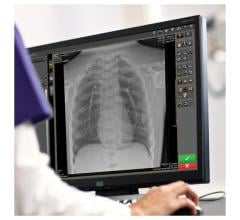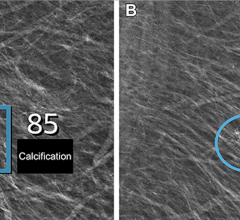February 27, 2012 — Based on a study of nearly 2,000 breast cancer patients, researchers at the Swedish Cancer Institute in Seattle say that, in women between the ages of 40 and 49, breast cancers detected by mammography have a better prognosis. The study appears in the March issue of Radiology.
“In our study, women aged 40 to 49 whose breast cancer was detected by mammography were easier to treat and had less recurring disease and mortality, because their cancer was found at an earlier stage,” said Judith A. Malmgren, Ph.D., president of HealthStat Consulting Inc.
Malmgren and a team of researchers reviewed breast cancer patient data from a dedicated registry at the Swedish Cancer Institute’s community cancer center. The researchers analyzed data on 1,977 breast cancer patients between the ages of 40 and 49 who were treated between 1990 and 2008. The researchers looked at method of diagnosis (detected by mammography, patient or physician), stage at diagnosis (0-IV, confirmed by biopsy), treatment, and annual follow-up information, including recurrence of disease.
“Our goal was to assess the differences between mammography and non-mammography detected breast cancer, to determine whether earlier detection confers a treatment and morbidity advantage because the disease is found at an earlier stage,” Malmgren said.
The data analysis revealed a significant increase in the percentage of mammography-detected breast cancer over the 18-year period: from 28 percent in 1990 to 58 percent in 2008. Over the same period, patient- and physician-detected breast cancer declined from 73 percent of all cases in 1990 to 42 percent in 2008.
“The shift toward more mammography-detected breast cancer cases was accompanied by a shift toward diagnosis at an earlier stage of disease that required less treatment,” Malmgren said.
Over the 18-year period, the number of breast cancers diagnosed at Stage 0 increased by 66 percent, while the number of Stage III breast cancers decreased by 66 percent. The majority of Stage 0 cancer cases were ductal carcinoma in situ (DCIS), a non-invasive cancer that is confined to a milk duct. The treatment of DCIS remains controversial, because not all experts agree that it is potentially life threatening.
Malmgren said another key finding of the study was the extent of treatment patients received. Compared with women whose cancer was self-detected or discovered by a physician, patients whose cancer was detected using mammography were more likely to have breast-conserving treatment and less likely to have chemotherapy. Specifically, they were more likely to undergo lumpectomy (67 percent versus 48 percent), less likely to undergo modified radical mastectomy (25 percent versus 47 percent), and less likely to die of breast cancer (4 percent versus 11 percent).
“The benefits of breast cancer treatment are accompanied by significant harms,” Malmgren said. “Chemotherapy may have long-lasting toxic effects on a woman’s body, and mastectomy and reconstructive surgery are difficult and expensive operations that can have a significant effect on body image.”
For more information: radiology.rsna.org/


 July 29, 2024
July 29, 2024 








